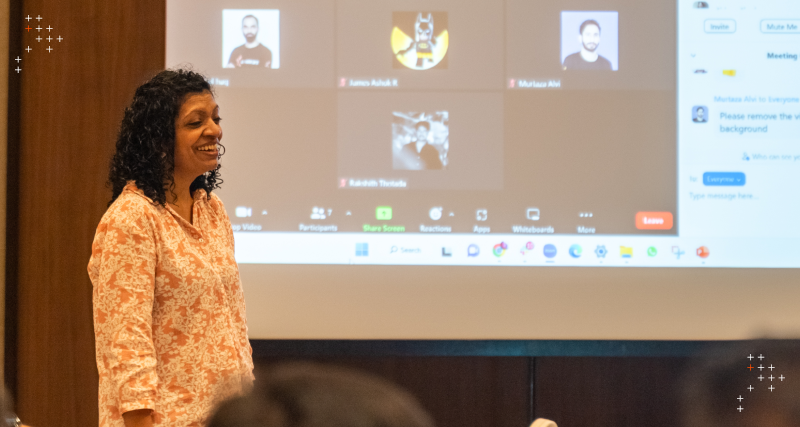Introduction
This article shows why expecting people to always say “yes”to requests and demands in an authoritative work environment ends up hurting the organization's growth, and what agencies can do to bring about a positive change.
The pressure to meet client demands and deliver high-quality results in fast-paced digital agencies is alarming.
A recent study by Asana found that almost 1 in 4 workers experience burnout four or more times annually, often due to authoritative management styles and lack of input in decision-making.
That means the key drivers of success and growth that enable a company to thrive—creativity, agility, and collaboration—take a direct hit.
Understanding Authority-Driven Cultures
When April, a Project Manager at a global IT firm, saw the glaring flaw in the project brief—underestimation of the work scope, and, as a result, the time it would take to deliver the project, she didn’t say anything.
She already knew what was expected of her and the team. Saying “no” wasn’t in the cards.
So she kept shut, and the project kicked-off.
She kept shut when things began to spill over one deadline to the other. And she kept shut when the actual project costs were starting to look steeper than expected.
By the time the project was delivered, everyone, from the clients to the CEO to the team members were wary. The project had left a bitter taste in their mouth.
Within the next five months, April, along with three of her teammates, resigned.
Authority-driven cultures are organizational environments where decision-making power is concentrated at the top levels of management.
Employees often feel compelled to submit to the directives of their managers without question.
The Pressure to Say Yes
The pressure to comply with their leaders and managers can be overwhelming for employees in digital agencies.
This pressure often stems from a fear of negative consequences, such as job loss, demotion, or being perceived as uncooperative.
In her book You Have More Influence Than You Think, author Vanessa Bohns highlights how our reluctance to refuse requests stems from a fear of disagreement and social awkwardness.
Bohns's studies reveal that people often agree to requests even when doing so makes them uncomfortable.
And she also found that people generally underestimate their level of influence on others, especially in a position of authority.
This dynamic is particularly problematic in hierarchical settings, like at work, where employees feel pressured to comply with the demands from leaders, often leading to overcommitment.
The most shocking discovery from Bohns's experiments showed that people were willing to commit minor acts of vandalism or falsify documents—simply because they found it hard to refuse a direct request.
Cost On Individual And Team Performance
“It all comes down to the power of choice. When team members don't have any say or don't feel like they can voice their opinions at work, they can suffer from low morale, their mental, physical, and emotional health is impacted," explained Mridula Ujjwal, Axelerant’s Director of People Transformation.
The pressure to say yes all the time undermines employees' psychological safety, the belief that one can speak up without fear of negative consequences.
And without psychological safety, people are less likely to voice their concerns, ideas, or objections, leading to a culture of meek compliance rather than one of innovation and critical thinking.
People’s Productivity Levels Tank
According to research published by Gallup Workplace, not being able to say “no” often leads to employees taking on more work than they can handle.
And that soon leads to burn out and the research made shocking discoveries around this:
- 23% of employees feel burned out at work very often or always
- An additional 44% feel burned out sometimes, meaning about two-thirds of full-time workers experience burnout on the job
Such high burnout rates make a significant dent on overall productivity.
Burned-out employees are 63% more likely to take a sick day. They also experience 13% lower confidence in their performance compared to others.
According to an article by Harvard Business Review, teams with high psychological safety, on the other hand, feel more engaged and motivated, show better decision-making skills, and embrace continuous learning and improvement.
Mental Health Deteriorates
This constant pressure to comply can have significant psychosomatic effects, where the mind’s condition starts affecting the body.
The American Psychological Association’s Work and Well-Being Report highlights that nearly 79% of employees experience work-related stress, with significant impacts on their physical and mental well-being.
The survey found that this stress led to various negative outcomes: nearly 60% of employees reported a lack of interest, motivation or energy.
36% experienced cognitive weariness, 32% felt emotionally exhausted, and a staggering 44% reported physical fatigue.
These chronic stressors can manifest as health issues such as headaches, muscle tension, and sleep disturbances, all of which decrease productivity and increase absenteeism.
Long-Term Effects On Agency Success
The negative effects of having an authoritative culture where people aren’t empowered to call out things that won’t work out can have serious business impact.
In today's competitive business environment, the health and engagement of your people are directly linked to your agency's success.
When employees are disengaged or pressured to comply without voicing their concerns, it leads to significant long-term repercussions. Here are three critical areas where this impact is most evident:
High Attrition
Employee turnover is a substantial cost for any organization. And a non-collaborative environment is one of the major reasons for people wanting to leave.
A Gallup research found that 52% of employees globally are either actively seeking or watching for new job opportunities, and more than half the world's employees were watching for or actively seeking a new job in 2023.
For digital agencies, this high attrition rate means constant disruptions in project deliveries and the loss of valuable institutional training and knowledge.
Now consider the financial cost of replacing employees. Researchers estimate that it costs roughly half a frontline worker's salary and up to 2.5 times a knowledge worker's salary to replace them.
Low engagement levels, which are typical of authoritative workplaces, are a good indicator of things going sideways.
Because when engagement drops, employees are 45% more likely to leave within six months.

Static Business Practices And Lack of Innovation
A collaborative culture is crucial for innovation. And agencies that encourage inclusivity and psychological safety see significant benefits in this aspect.
A study by Deloitte Insight discovered that inclusive cultures are twice as likely to meet or exceed financial targets, three times more likely to be high performing, six times more likely to be innovative and agile, and eight times more likely to achieve better business.
Conversely, agencies that rely on top-down, authority-driven management styles often stagnate.
As digital transformation accelerates, and AI shakes the very foundation of how we work, upskilling the workforce becomes increasingly urgent. Agencies that fail to innovate risk being left behind in a rapidly evolving market.

Slumping Revenue Growth
Employee engagement, especially in decision-making that affects them at work, directly correlates with financial performance of an organization.
This research, published in Harvard Business Review discovered companies with highly engaged employees outperform those with most disengaged workforces by 89% in customer satisfaction and fourfold in revenue growth.
A workforce that is not fully engaged translates into millions of dollars wasted on a per-company basis and billions globally.
Apart from the big three, on-the-face consequences, there are some other, insidious signs that can crop up within agencies.
- Talented people will leave faster
- People will take more sick leaves for the need to escape often
- Organization’s goodwill will suffer through gossip and bad employee reviews
- Growth will be based on biases and favoritism instead talent or impact created
- Trust and engagement in teams will go down remarkably
- The organization will function from a fear driven culture
- There will be low tolerance for mistakes and high chances of repercussions
- Work will get suffer from bureaucracy and bottlenecks
- Teams and people will exhibit low agility in project delivery

Signs Your Agency Might Be Suffering
A survey conducted by McKinsey Health Institute found that there’s an average of 22% gap between employer and employee perceptions of workplace mental health and well-being.
This indicates that even though a company might be hurting, agency leaders and CEOs may not even be aware of the looming problem.
“Apart from high attrition rate and low engagement, there are other signs that agency leaders should look out for to detect early on if the organization is hurting in this department,” said Mridula.
- Employee Net Promoter Score (eNPS)
Low scores often indicate dissatisfaction and a lack of enthusiasm for the company. Detailed surveys and carefully crafted questions with anonymity might help uncover lurking issues.
- Feedback On Leadership
Consistent negative feedback on leadership practices—on review platforms like Google, Glassdoor, Ambion Box—may highlight issues with authoritative management styles that people find most distressing.
- Lack Of Kindness And Openness
Good leadership balances assertiveness and kindness so that they are understanding of peoples’ challenges. And they demonstrate openness to their own challenges to create a culture of transparency.
In authoritative environments, there is often a complete lack of openness and kindness among leaders, and there is minimum tolerance among senior leaders which often leads to unprofessional behavior.
- Lack Of Enthusiasm To Growth
Employees and team members will rarely demonstrate inclination towards opportunities of personal development and growth.
And feedback from the leaders, even when constructive, may be perceived as an attack on their performance or tenure in the company.
- Unhealthy Competition
Employees may withhold information, sabotage colleagues, and prioritize personal success over team achievements.
Leaders may see increasing cases of conflicts, lack of teamwork, and a decline in collaborative projects.
- Micromanagement
Employees often complain about being micromanaged, and people managers report feeling overwhelmed as they need to constantly watch over their reports’ shoulders. The overall result? Reduced morale, hampered trust, and strained productivity.
- Communication Breakdowns
Poor communication and information flow within teams and departments that hampers project deliveries. People are generally apprehensive about sharing knowledge with their guard down.
How Can Agency Leaders Enable Teams To Say No
Consider this.
Asana Anatomy of Work Index found 1 in 5 workers said mental health resources and clarity on organizational goals would alleviate the impact of burnout. They also said that they could save 5.4 hours per week — equivalent to 6 working weeks (257 hours) a year — if processes were improved.
The writing is on the wall.
Well supported employees who know they will be heard perform better in every comparable way.
Agency leaders can start by ensuring some of the following points with the help of planned coaching.
Promote Open Communication
Create an environment where team members feel safe to voice their opinions and concerns without fear.
This can be achieved through regular team meetings, constructive and kind feedback channels, and a leadership style that values transparency and honesty.
Encourage Inclusive Decision-Making
Involve team members in the decision-making process to ensure they feel their input is valued.
This not only increases engagement but also helps in making better, well-rounded decisions. Inclusive decision-making cultivates a sense of ownership and responsibility among employees.
Acknowledge And Act On Feedback
Show employees that their inputs are valued by actively listening, acknowledging, and implementing their suggestions where feasible.
This can be a powerful step to show your employees that they are heard.
And it can encourage real feedback where feedback matters the most: in their work. People won’t hesitate to call out everything that isn’t working, or in other words, is hurting your agency.
Go For Team Building Activities
Organize team-building activities that promote trust and collaboration.
These activities can help break down barriers between team members, siloes between teams, and create a more cohesive and supportive work environment.
When people feel connected to their colleagues, they are more likely to feel comfortable saying no when necessary.
Regularly Review And Adjust Workloads
Regularly assess team members' workloads to ensure they are manageable.
In empowering work cultures, employees don’t hesitate to inform their leaders if work is becoming unmanageable—before there’s any chances of fallout like burnout, absenteeism, health issues—which can result in derailment of work.
Adjusting workloads to be more balanced can help employees maintain a healthy work-life balance and improve their overall productivity.
Recognize And Reward Contributions
Acknowledge and reward employees' hard work and contributions.
Recognition can be a powerful motivator and help build a positive work culture where employees feel valued.
When employees know their efforts are appreciated, they are more likely to feel confident in setting boundaries and saying no when necessary.

Why Do You Need 1-on-1 Coaching?
There’s a common thread among all the strategies to build a more empowered workforce.
Leadership.
It all comes down to the leaders and their commitment to building a sustainable, profitable, and empowering workspace.
None of the methods to empower people in an agency would actually work if the leadership is not committed to cultivating a collaborative and inclusive work culture where people feel seen, heard, and empowered to say no.
Saying no doesn’t come easily even in good workplaces.
Leaders are responsible for enabling employees so that they feel comfortable showing courage, seeking clarity, and demonstrating assertiveness—all the characteristics needed to say what needs to be said.
Direct, 1-on-1 coaching enables leaders with the necessary tools and skills, such as emotional intelligence, conflict resolution, and increased self-awareness, to create inclusive, psychologically safe workspaces.
Where people can confidently and willingly say no, and own the responsibility that comes with their decision for the agency’s good.

Rohit Ganguly, Content Marketer
Rohit is a content marketer first and a YouTuber second. He loves to interact with animals, feed them, clean his apartment, and spend time with friends and family. Curious by nature, he also enjoys literature, movies, meditation, and calligraphy.

 We respect your privacy. Your information is safe.
We respect your privacy. Your information is safe.



Leave us a comment